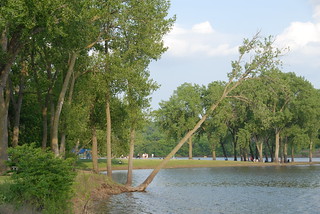If a Tree Falls in the Forest
By: Justin Zablocki (author, Zablocki Bros. LLC) on October 10th, 2013 12:00 AM.
FacebookTwitterGoogle+PinterestReddit

http://www.flickr.com/photos/guppiecat/528896896/sizes/n/in/photostream/
If a tree falls in the forest and no one is around to hear it, does it make a noise?
If nobody is looking at the moon, does it exist.
The first riddle originates, in a slightly different form, from a June 1883 edition of a magazine called The Chautauquan. The second riddle is a question that is said to have been asked by Albert Einstein to Niels Bohr. When looking at these questions in a scientific and logical way, the answer to the first is no and the answer to the second is yes. The first riddle proposes that nobody is around to hear the sound. If nobody is there to hear the sound then the waves the tree creates in the air that could be perceived as sound is never converted into vibrations of the hairs in our ears. Since sound is perceived by our brains, if these waves never reach someone's brain they can never truly be sound. The solution to the second riddle could be yes because based on our experience and scientific understanding, just because we don't look at it doesn't make it physically disappear.
In contrast, looking at these questions in a philosophical way paints a different picture of these solutions. Since vision and hearing are traits of living things, namely humans, our brains put together the various inputs they receive and construct all of our senses. So we are not there to hear the tree or see the moon then our brains cannot construct the sound or sight that in essence, are the moon and sound of the tree. So looking at these riddles in philosophical ways creates an ambiguity that makes us unsure to the solution to both of these riddles. If we can't perceive them, then we have no way of proving or disproving them.
For more information about these problems visit the Wikipedia page for If a tree falls in a forest.
For some more riddles visit our Best Riddles Section.